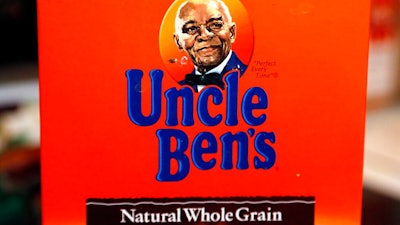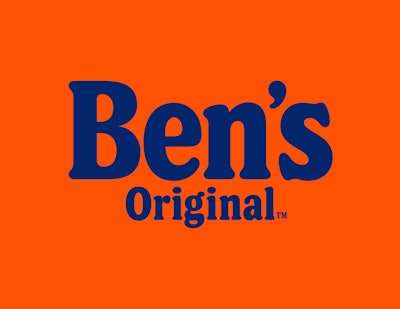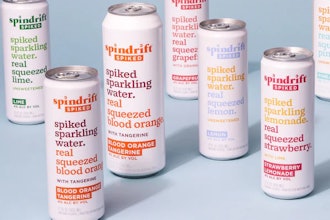
NNEW YORK (AP) — The Uncle Ben's rice brand is getting a new name: Ben's Original.
Parent firm Mars Inc. unveiled the change Wednesday for the 70-year-old brand, the latest company to drop a logo criticized as a racial stereotype. Packaging with the new name will hit stores next year.
“We listened to our associates and our customers and the time is right to make meaningful changes across society,” said Fiona Dawson, global president for Mars Food, multisales and global customers. “When you are making these changes, you are not going to please everyone. But it's about doing the right thing, not the easy thing.”
Several companies have retired racial imagery in recent months, a ripple effect from the Black Lives Matters protests over the police killing of George Floyd and other African Americans.

“It’s a chain reaction of sorts and it’s really good and interesting to see so much introspection being done in these companies to change the trademarks that they’ve invested in,” said Riché Richardson, an associate professor of African American literature at Cornell University, who called for Aunt Jemima’s retirement five years ago in a New York Times opinion piece. “There is a challenge for some people in letting go of these images because they wrongly link them with a sense of Black identity and empowerment when in reality these images have never empowered Black people.”
The owner of Eskimo Pie has also said it will change its name and marketing of the nearly century-old chocolate-covered ice cream bar.
Geechie Boy Mill, a family-owned operation in South Carolina that makes locally-grown and milled white grits, is also planning a name change, according to owner Greg Johnsman. Geechie is a dialect spoken mainly by the descendants of African-American slaves who settled on the Ogeechee river in Georgia, according to Merriam-Webster.com.
Beyond food brands, the Washington NFL franchise dropped the “Redskins” name and Indian head logo amid pressure from sponsors including FedEx, Nike, Pepsi and Bank of America.
Mars had announced in the summer that the Uncle Ben's brand would “evolve.”
Since the 1940s, the rice boxes have featured a white-haired Black man, sometimes with a bow tie, an image critics say evokes servitude. Mars has said the face was originally modeled after a Chicago maitre d' named Frank Brown. In a short-lived 2007 marketing campaign, the company elevated Uncle Ben to chairman of a rice company.
Dawson said months of conversations with employees, customer studies and other stakeholders led the company to settle on "Ben's Original. She said the company is still deciding on an image to accompany the new name.
Americus Reed II, professor of marketing at The Wharton School of the University of Pennsylvania, said the challenge for brands like Aunt Jemima and Uncle Ben's is to come up with an new image that isn't boring. He said Mars likely settled on keeping the name “Ben" to avoid “throwing the baby out with the water.” But now, Reed said, the brand might have to define who Ben is without sparking a new controversy.
“You don't want to step in it twice,” Reed said. “I think what you might see is a very watered-down, safe creativity. Let's not step on anyone's toes. You'll see that for a while.”
Mars announced several other initiatives, including a $2 million investment in culinary scholarships for aspiring Black chefs in partnership with the National Urban League.
It also is planning a $2.5 million investment in nutritional and education programs for students in Greenville, Mississippi, the majority African-American city where the rice brand has been produced for more than 40 years.
Greenville Mayor Errick D. Simmons said it's always been a source of pride for the city to be home to the famous rice brand, despite the controversy over the name. He said Mars is the third-largest employer in Greenville, creating more than 1,000 direct and indirect jobs, from rice farmers to truck drivers.
Simmons praised Mars for seeking the city leadership's input on the name change through several meetings in his office. For Greenville, he said it was important that shoppers continue to seek and find Ben's Original in stores with its signature blue and orange packaging “so that people here can continue to stay employed.”
“For a company, a global multinational company, to be having these conversations with an African American male mayor sends the right signal to the world," Simmons said.






















